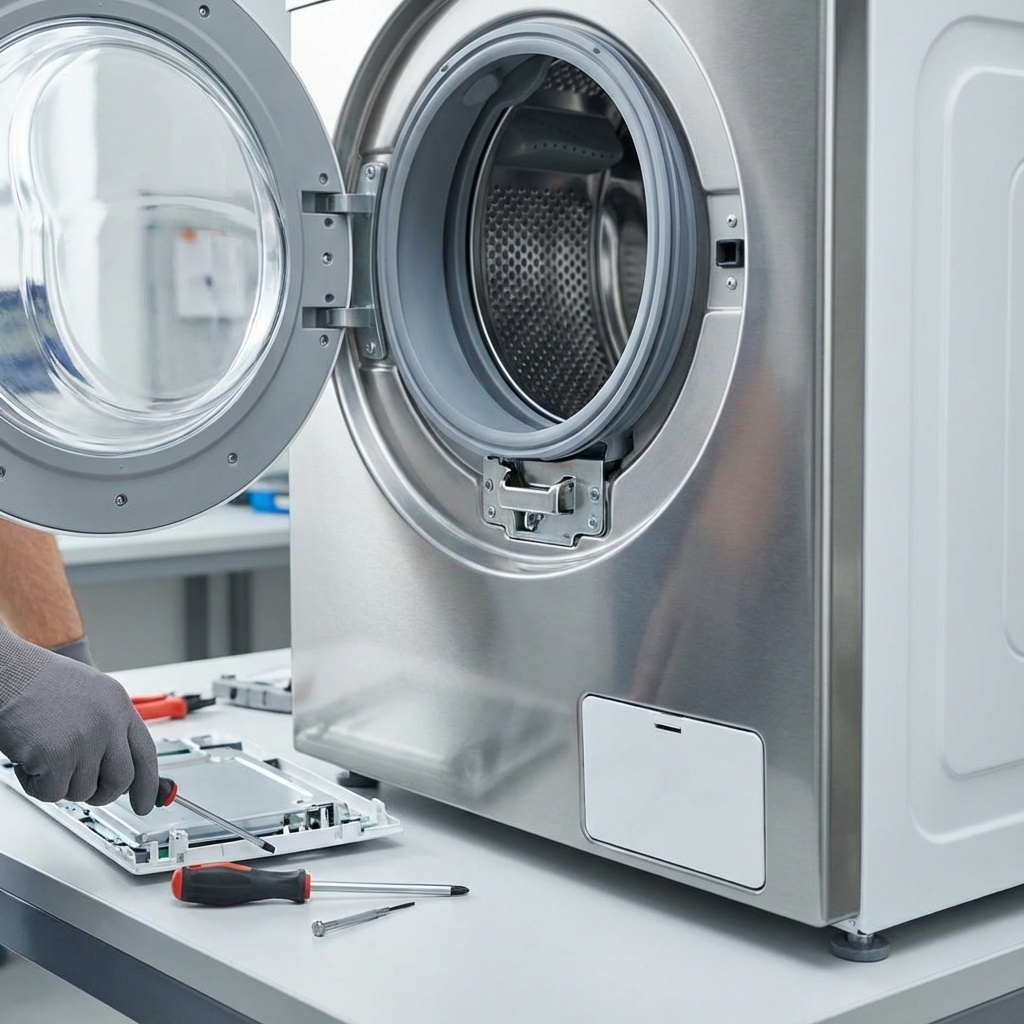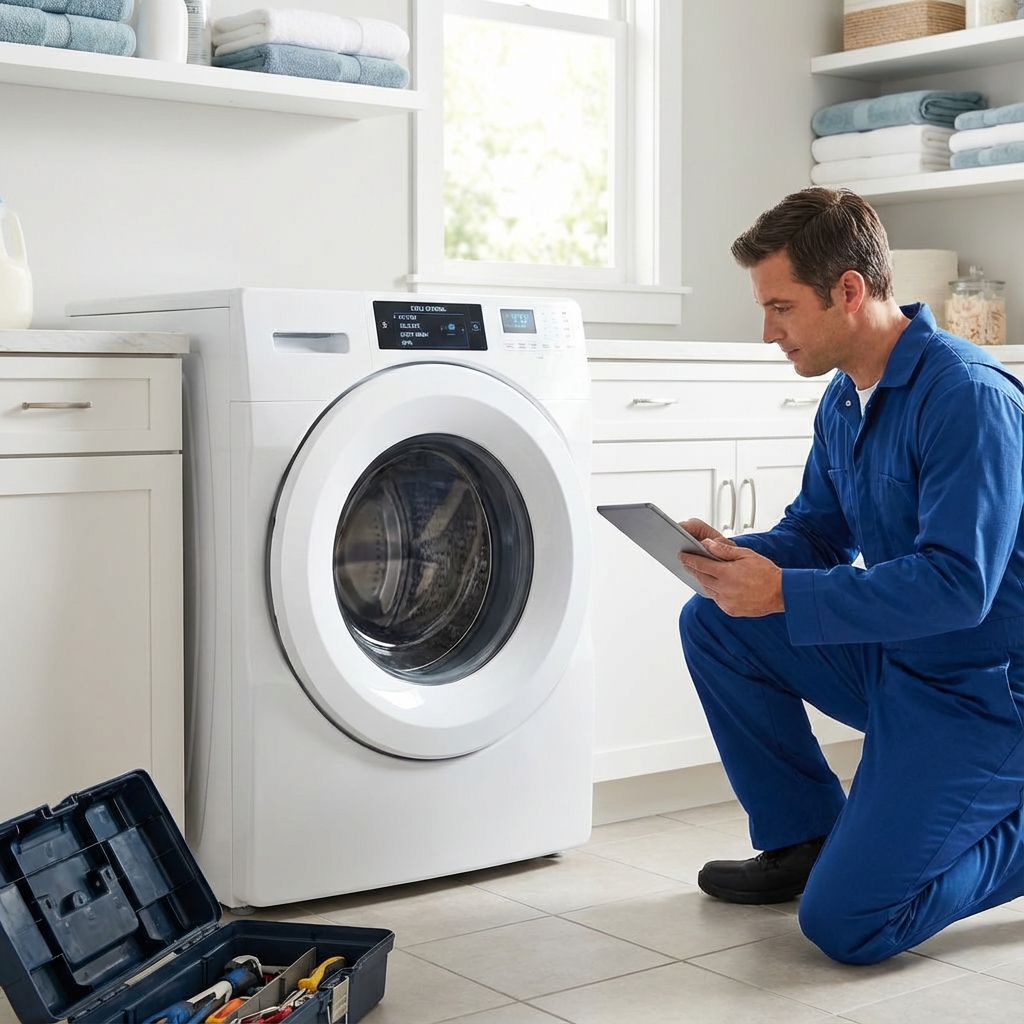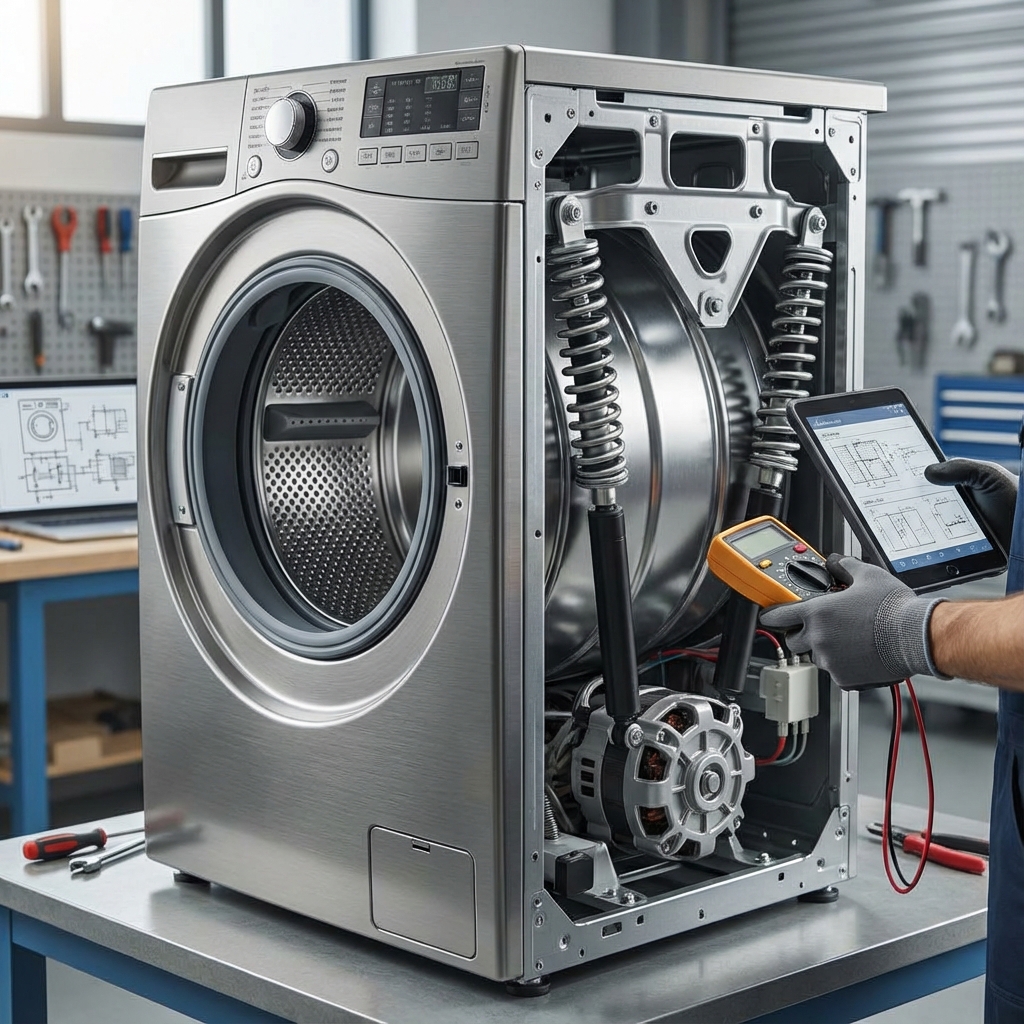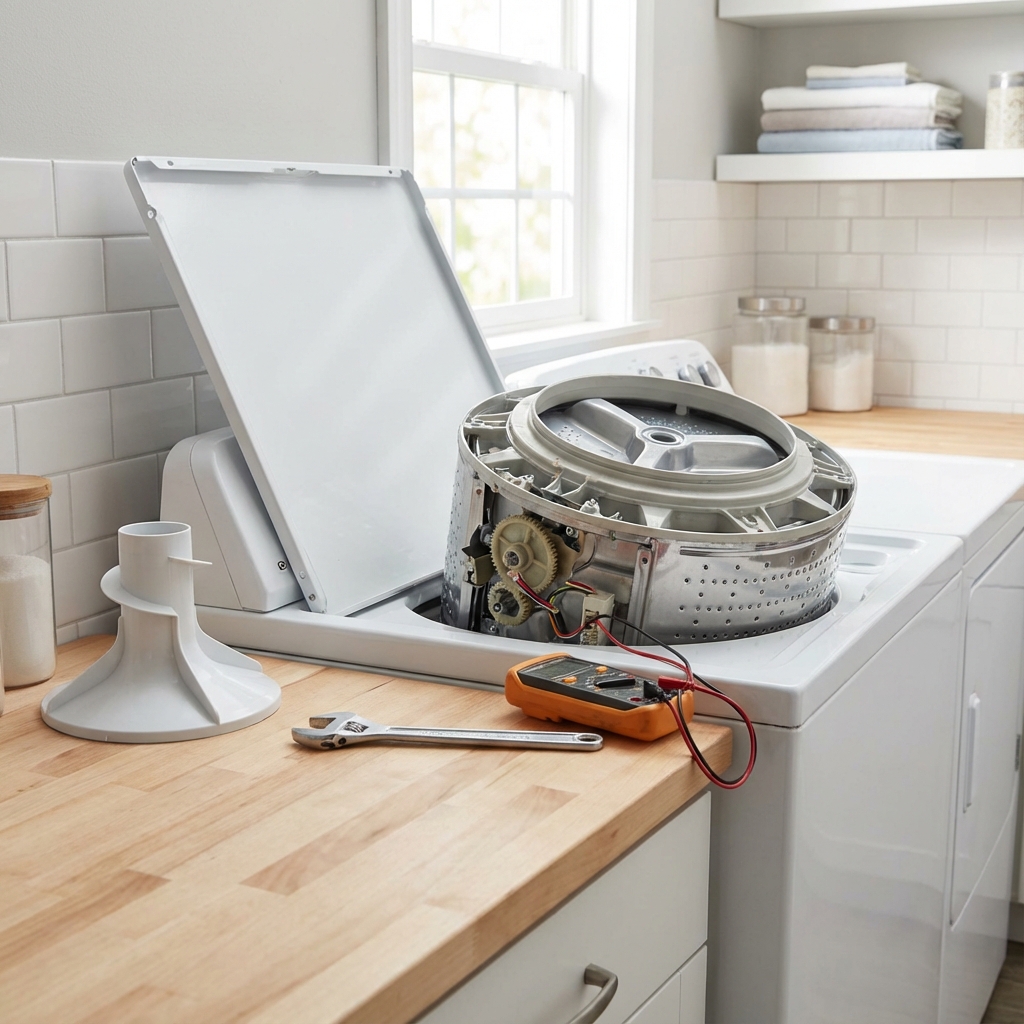Washing Machine Door/Lid Issues? Expert Door Repair Toronto
Washing machine door and lid problems can prevent proper operation and create safety concerns in Toronto homes. Door and lid issues typically involve faulty latches, worn seals, damaged hinges, or electronic lock malfunctions that prevent proper opening, closing, or sealing. Understanding door and lid mechanisms, identifying component problems, and implementing professional repair solutions ensures your washing machine operates safely and efficiently. Proper door and lid maintenance are essential for appliance performance and user safety.
Quick Answer: Washing machine door or lid won't open or close? Professional door/lid repair service in Toronto. Expert solutions for latch, seal, and hinge problems from JK Appliances. This is a common issue that can usually be resolved with proper troubleshooting. If the problem persists, professional diagnosis is recommended.
Understanding Door and Lid Systems
FRONT-LOADING MACHINE DOOR SYSTEMS
Door Components and Functions
Essential door elements:
- Door seal (boot): Rubber seal preventing water leaks during operation
- Door latch assembly: Mechanical and electronic locking mechanism
- Door hinges: Support and movement mechanism for door operation
- Door glass: Viewing window and structural door component
- Safety interlock: Electronic safety system preventing operation with open door
Common Door Problems
Typical door malfunctions:
- Seal deterioration: Cracked, torn, or moldy door seals
- Latch failure: Broken or misaligned door latch mechanisms
- Hinge problems: Worn or damaged door hinges affecting operation
- Lock malfunctions: Electronic door lock failures preventing operation
- Glass damage: Cracked or broken door glass requiring replacement
TOP-LOADING MACHINE LID SYSTEMS
Lid Components and Functions
Essential lid elements:
- Lid switch: Safety switch preventing operation with open lid
- Lid hinges: Support mechanism for lid opening and closing
- Lid lock: Locking mechanism securing lid during operation
- Lid seal: Gasket preventing water splash and maintaining efficiency
- Safety interlock: Electronic system ensuring safe operation
Common Lid Problems
Typical lid malfunctions:
- Switch failure: Faulty lid switch preventing machine operation
- Hinge wear: Worn hinges affecting lid operation and alignment
- Lock problems: Lid lock failures preventing proper securing
- Seal deterioration: Worn lid seals allowing water splash
- Alignment issues: Misaligned lids affecting proper closure and operation
SAFETY AND INTERLOCK SYSTEMS
Safety Mechanism Functions
Safety system operations:
- Door/lid position sensing: Detection of proper door/lid closure
- Lock engagement: Secure locking during machine operation
- Safety interlocks: Prevention of operation with open door/lid
- Emergency release: Manual release mechanisms for safety
- Status indication: Visual or audible indication of door/lid status
Electronic Control Integration
Control system interaction:
- Sensor communication: Door/lid status communication with control board
- Cycle control: Door/lid status affecting cycle operation
- Error detection: System detection of door/lid problems
- Safety protocols: Automatic safety responses to door/lid issues
- User interface: Display of door/lid status and error messages
Diagnostic Procedures
INITIAL ASSESSMENT
Problem Identification
Issue evaluation process:
- Symptom analysis: Identify specific door/lid operation problems
- Visual inspection: Examine door/lid components for obvious damage
- Operation testing: Test door/lid opening, closing, and locking
- Safety system check: Verify safety interlock operation
- Error code analysis: Interpret any displayed error codes
Component Inspection
Preliminary examination:
- Seal condition: Check door/lid seals for damage or wear
- Latch alignment: Verify proper latch alignment and operation
- Hinge function: Test hinge operation and support
- Lock mechanism: Check lock engagement and release
- Switch operation: Test switch function and response
SYSTEMATIC DIAGNOSIS
Mechanical Component Testing
Detailed mechanical evaluation:
- Latch testing: Complete latch mechanism inspection and testing
- Hinge assessment: Evaluate hinge condition and operation
- Seal inspection: Thorough seal condition and integrity assessment
- Lock testing: Test lock mechanism engagement and release
- Alignment verification: Check proper door/lid alignment
Electronic System Testing
Electronic component evaluation:
- Switch testing: Test lid switch or door lock switch operation
- Sensor testing: Verify position and status sensor function
- Control board communication: Test communication between components
- Interlock testing: Verify safety interlock system operation
- Wiring inspection: Check wiring connections and integrity
Safety System Verification
Safety mechanism testing:
- Emergency release testing: Verify manual release mechanism operation
- Safety interlock verification: Test safety system responses
- Error detection testing: Verify proper error detection and reporting
- Cycle prevention testing: Confirm operation prevention with open door/lid
- Status indication testing: Verify proper status indication systems
Professional Door and Lid Repair Solutions
DOOR SEAL AND GASKET REPAIR
Door Seal Replacement
Seal system restoration:
- Seal assessment: Complete evaluation of door seal condition
- Seal removal: Careful removal of old or damaged seals
- Surface preparation: Clean and prepare seal mounting surfaces
- New seal installation: Proper installation of new door seals
- Alignment verification: Ensure proper seal alignment and function
Gasket Service
Gasket maintenance and replacement:
- Gasket inspection: Thorough evaluation of all gasket components
- Cleaning service: Deep cleaning of gaskets and mounting areas
- Gasket replacement: Installation of new gaskets when needed
- Seal testing: Verify proper sealing and water containment
- Performance optimization: Optimize gasket performance and longevity
LATCH AND LOCK REPAIR
Door Latch Service
Latch mechanism restoration:
- Latch disassembly: Complete latch mechanism disassembly
- Component inspection: Detailed inspection of latch components
- Part replacement: Replace worn or damaged latch parts
- Mechanism adjustment: Proper latch adjustment and alignment
- Operation testing: Verify smooth latch operation and engagement
Electronic Lock Repair
Lock system service:
- Lock mechanism testing: Complete electronic lock system testing
- Actuator replacement: Replace faulty lock actuators
- Control circuit repair: Repair electronic lock control circuits
- Sensor replacement: Install new position or status sensors
- System calibration: Calibrate lock system for proper operation
HINGE AND SUPPORT REPAIR
Hinge Replacement and Service
Hinge system restoration:
- Hinge assessment: Complete evaluation of hinge condition and operation
- Hinge replacement: Install new hinges with proper alignment
- Lubrication service: Proper lubrication of hinge mechanisms
- Adjustment service: Adjust hinges for smooth operation
- Support verification: Ensure proper door/lid support and movement
Structural Repair
Door/lid structural service:
- Frame repair: Repair damaged door or lid frames
- Glass replacement: Replace cracked or broken door glass
- Mounting repair: Repair or replace mounting points and hardware
- Alignment correction: Correct door/lid alignment issues
- Reinforcement service: Strengthen weak or damaged structural components
SAFETY SYSTEM REPAIR
Switch and Sensor Service
Safety component restoration:
- Switch replacement: Install new lid switches or door switches
- Sensor calibration: Calibrate position and status sensors
- Wiring repair: Repair damaged wiring and connections
- Control integration: Ensure proper integration with control systems
- Safety verification: Verify all safety system functions
Interlock System Service
Safety interlock restoration:
- Interlock testing: Complete safety interlock system testing
- Component replacement: Replace faulty interlock components
- System programming: Program or reprogram interlock systems
- Safety protocol verification: Verify proper safety protocol operation
- Emergency system testing: Test emergency release and safety systems
JK Appliances Door and Lid Repair Service
EXPERT DIAGNOSIS AND REPAIR
Comprehensive Assessment
Professional door/lid evaluation:
- Complete system analysis: Thorough door/lid system inspection and testing
- Component evaluation: Detailed assessment of all door/lid components
- Safety system verification: Complete safety system testing and verification
- Root cause identification: Determine exact causes of door/lid problems
- Repair planning: Develop comprehensive repair strategy and timeline
Professional Repair Benefits
Expert service advantages:
- Experienced technicians: Specialized door/lid repair expertise
- Quality parts: OEM and high-quality replacement components
- Safety compliance: Ensure all safety systems operate properly
- Warranty coverage: Comprehensive repair warranties
- Performance guarantee: Ensure proper door/lid operation
SERVICE COVERAGE
Toronto Area Service
Complete GTA coverage:
- Downtown Toronto: Financial District, Entertainment District
- North York: Willowdale, Don Mills, Thornhill
- Scarborough: Agincourt, Malvern, Rouge
- Etobicoke: Islington, Rexdale, Mimico
- York Region: Markham, Richmond Hill, Vaughan
Emergency Service Options
Urgent door/lid repair:
- Same-day service: Emergency door/lid repair available
- Priority scheduling: Urgent repair appointments
- Safety-focused service: Immediate attention to safety-related issues
- Quick response: Rapid technician dispatch for urgent problems
Prevention and Maintenance
REGULAR MAINTENANCE SCHEDULE
Daily Operation Practices
Daily door/lid care:
- Gentle operation: Open and close doors/lids gently to prevent damage
- Proper closure: Ensure complete closure before starting cycles
- Load management: Avoid overloading that could stress door/lid systems
- Cleaning: Wipe down seals and surfaces after use
- Inspection: Quick visual check for obvious problems
Weekly Maintenance
Weekly care tasks:
- Seal cleaning: Clean door seals and gaskets thoroughly
- Hinge lubrication: Apply appropriate lubrication to hinges
- Latch testing: Test latch operation and alignment
- Safety check: Verify safety interlock operation
- Component inspection: Check for wear or damage
Monthly Maintenance
Monthly care tasks:
- Deep cleaning: Thorough cleaning of all door/lid components
- Seal conditioning: Apply seal conditioner to maintain flexibility
- Alignment check: Verify proper door/lid alignment
- Hardware inspection: Check all mounting hardware and fasteners
- Professional assessment: Schedule professional inspection if needed
USAGE BEST PRACTICES
Proper Operation Techniques
Operating practices for longevity:
- Gentle handling: Handle doors/lids gently to prevent damage
- Complete cycles: Allow cycles to complete before opening
- Proper loading: Load machines properly to prevent stress on door/lid
- Regular use: Use machine regularly to prevent component stagnation
- Immediate attention: Address problems immediately to prevent worsening
Environmental Considerations
Environmental factors affecting door/lid systems:
- Humidity control: Maintain appropriate humidity to prevent mold
- Temperature stability: Avoid extreme temperature changes
- Ventilation: Ensure proper ventilation around machine
- Cleaning products: Use appropriate cleaning products for components
- Professional service: Schedule regular professional maintenance
Troubleshooting Common Door and Lid Issues
DIY DIAGNOSIS AND SOLUTIONS
Basic Door/Lid Checks
User-level assessment:
- Visual inspection: Look for obvious damage or misalignment
- Operation testing: Test opening, closing, and locking functions
- Cleaning: Clean seals, latches, and contact surfaces
- Alignment check: Verify proper door/lid alignment
- Safety testing: Test safety interlock operation
Simple Solutions
Basic fixes users can attempt:
- Cleaning: Clean dirty or sticky components
- Lubrication: Apply appropriate lubrication to hinges
- Adjustment: Minor adjustments to latch or alignment
- Seal care: Clean and condition door seals
- Reset: Reset electronic systems if applicable
WHEN TO CALL PROFESSIONALS
Professional Service Indicators
Signs requiring expert repair:
- Safety system failures: Any safety interlock or switch problems
- Structural damage: Cracked, broken, or severely damaged components
- Electronic malfunctions: Electronic lock or control system problems
- Persistent problems: Issues continuing despite basic troubleshooting
- Water leaks: Any water leakage around door or lid seals
Safety Considerations
Safety-related concerns:
- Lock malfunctions: Any problems with door/lid locking mechanisms
- Safety switch failures: Faulty safety switches allowing unsafe operation
- Structural integrity: Any damage affecting door/lid structural integrity
- Emergency release: Problems with emergency release mechanisms
- Electrical issues: Any electrical problems with door/lid systems
Cost Considerations and Value
REPAIR COSTS
Typical Repair Expenses
Door/lid repair pricing:
- Seal replacement: $100-200 for door seal replacement
- Latch repair: $80-150 for latch mechanism repair
- Hinge replacement: $60-120 for hinge replacement
- Electronic lock repair: $120-250 for electronic lock service
- Switch replacement: $50-100 for safety switch replacement
Cost vs. Replacement Analysis
Repair decision factors:
- Machine age: Cost-effective for machines under 10 years
- Problem severity: Simple component vs. major structural repair
- Safety implications: Safety-related repairs are typically worthwhile
- Overall condition: Consider other machine problems
LONG-TERM VALUE
Repair Investment Benefits
Professional repair advantages:
- Safety assurance: Proper safety system operation
- Extended lifespan: 3-5 additional years of reliable service
- Prevented damage: Early repair prevents additional component damage
- Efficiency maintenance: Proper sealing maintains washing efficiency
- User convenience: Restored proper door/lid operation
Prevention Investment
Maintenance value:
- Problem prevention: Regular maintenance prevents major door/lid issues
- Component protection: Proper care extends component life
- Safety maintenance: Consistent safety system operation
- Cost savings: Prevention less expensive than major repairs
- Appliance longevity: Proper maintenance extends overall machine life
FAQ: Washing Machine Door and Lid Issues
Q: Why won't my washing machine door open after a cycle? A: This could be due to a faulty door lock, safety interlock activation, or residual water in the system. Professional diagnosis can identify the specific cause.
Q: Can I replace a washing machine door seal myself? A: While possible, door seal replacement requires specific tools and expertise. Professional installation ensures proper sealing and prevents future problems.
Q: How much does it cost to fix a washing machine door that won't close? A: Repair costs range from $50-250 depending on the issue. Simple latch adjustments are less expensive than electronic lock replacement.
Q: Why does my washing machine lid keep popping open? A: This typically indicates a faulty lid lock, worn latch, or safety switch problem that requires professional repair.
Q: When should I replace my washing machine instead of repairing door/lid issues? A: Consider replacement if repair costs exceed 40% of a new machine's price, or if the machine has multiple major problems.
Related Articles
- Washing Machine Not Spinning? Expert Spin Cycle Repair Toronto
- Washing Machine Vibrating Excessively? Expert Vibration Repair Toronto
- Washing Machine Odor Issues? Expert Odor Elimination Toronto
- Professional Washing Machine Installation Service Toronto
- Washing Machine Cycle Issues? Expert Cycle Repair Toronto
Washing machine door/lid issues in Toronto? Contact JK Appliances at +1 647-560-8966 for expert door repair service. Same-day service available for urgent door problems.
Common Questions People Ask
Q: Is it normal for my washing machine door repair to have issues? No, this is not normal behavior and indicates an underlying issue that should be addressed promptly to prevent further damage.
Q: Can I fix this washing machine door repair problem myself? Some basic issues can be resolved with DIY troubleshooting, but complex problems require professional diagnosis to avoid safety risks and warranty issues.
Q: How much does professional washing machine door repair repair cost in Toronto? Repair costs typically range from $150-$400 depending on the specific issue and parts needed. Our technicians provide free estimates before any work begins.
Q: How long does washing machine door repair repair take? Most repairs are completed within 1-2 hours during a single visit. Some cases may require ordering specialty parts with a follow-up appointment.
Q: Should I repair or replace my washing machine door repair? If your washing machine door repair is less than 8 years old and repair costs are under 50% of replacement cost, repair is usually the better value. Our technicians can help you make the right decision.
Q: Do you offer same-day washing machine door repair repair in Toronto? Yes! We offer same-day and emergency repair services throughout Toronto and the Greater Toronto Area for urgent issues.
Q: What brands of washing machine door repair do you repair? We service all major brands including Bosch, Samsung, LG, Whirlpool, KitchenAid, GE, Maytag, Frigidaire, Miele, and more.
Q: Is washing machine door repair repair covered by warranty? Many washing machine door repair issues are covered under manufacturer warranty. We can help verify your warranty status and handle claim processing.
Expert Tips & Pro Insights
💡 Pro Tip: Regular maintenance can prevent 80% of appliance problems. Follow manufacturer guidelines for cleaning and care.
⚠️ Safety Warning: Always disconnect power before attempting any repairs or inspections. If you smell gas, evacuate immediately and call emergency services.
🔧 Technician Insight: Many issues that seem complex often have simple solutions. Start with basic troubleshooting before assuming the worst.
📞 When to Call a Professional: If you encounter electrical components, gas lines, refrigerant systems, or if basic troubleshooting doesn't resolve the issue, it's time to call an expert.





